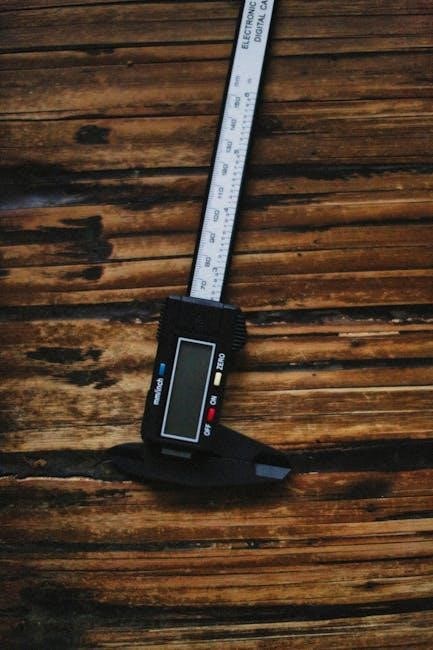
The ABC Scale PDF is a valuable tool for assessing balance confidence‚ created to evaluate an individual’s stability during various daily activities. It provides a structured guide for clinicians and patients to measure and improve balance-related outcomes effectively in rehabilitation settings.
Definition and Purpose
The ABC Scale is a self-reported measure designed to assess an individual’s confidence in performing various balance-related activities. It serves as a tool to evaluate balance confidence‚ helping identify risks of falling and monitor progress in rehabilitation. The scale is widely used in clinical settings to guide treatment plans and improve patient outcomes‚ providing a clear framework for understanding and addressing balance-related challenges.
Relevance and Applications
The ABC Scale is highly relevant in rehabilitation‚ offering insights into balance confidence‚ which is crucial for preventing falls and improving mobility. Clinicians use it to assess patients’ abilities‚ tailor treatment plans‚ and track progress. Its applications extend to research‚ enabling studies on balance disorders and intervention effectiveness. Additionally‚ it serves as a valuable tool for educators and researchers‚ providing a standardized method to evaluate balance-related challenges and develop targeted therapies.

Structure of the ABC Scale
The ABC Scale is a 16-item self-report measure assessing confidence in performing balance-related activities. Each item is scored from 0 to 100‚ with higher scores indicating greater confidence.
Number of Items and Response Format
The ABC Scale consists of 16 items‚ each rated on a 0-100 scale. Respondents indicate their confidence in performing specific activities without losing balance. The format is user-friendly‚ allowing for self-administration or clinician guidance. Ratings are whole numbers‚ ensuring consistency. This structure simplifies data collection and scoring‚ making it accessible for both clinical and research purposes. The response format is designed to capture nuanced levels of confidence accurately.
Key Activities Assessed
The ABC Scale evaluates confidence in performing activities like walking on different surfaces‚ climbing stairs‚ reaching‚ and standing on moving surfaces. These tasks assess balance in various real-life scenarios‚ focusing on both simple and complex movements. The scale targets activities essential for daily living‚ providing insights into functional abilities and balance-related challenges. This comprehensive assessment helps identify specific areas where individuals may need targeted rehabilitation or support.

Scoring the ABC Scale
The ABC Scale scores range from 0 to 1600‚ calculated by summing ratings across 16 items and dividing by 16. Scores below 67 indicate a higher fall risk.
Calculation of the Total Score
The total score is calculated by summing the ratings from 0 to 100 across all 16 items. The sum is then divided by 16 to obtain the final score‚ ranging from 0 to 100. Scores below 67 indicate a higher risk of falling‚ providing a clear metric for assessing balance confidence and guiding clinical interventions.
Interpretation of Scores
The ABC Scale scores range from 0 to 100‚ with lower scores indicating reduced balance confidence. A score of 67 or below signifies a heightened risk of falling. This threshold helps clinicians identify individuals requiring targeted interventions to improve balance and reduce fall risks. The score interpretation provides actionable insights for tailoring rehabilitation programs and monitoring progress over time.

Importance of the ABC Scale in Rehabilitation
The ABC Scale is crucial in rehabilitation for assessing balance confidence‚ enabling clinicians to identify individuals at risk of falls and tailor interventions to enhance mobility and safety.
Applications in Clinical Practice
The ABC Scale is widely used in clinical practice to assess balance confidence in patients‚ particularly those with mobility issues. It helps identify individuals at risk of falls‚ enabling targeted interventions. Clinicians utilize the scale to monitor progress‚ adjust treatment plans‚ and improve patient outcomes. Its self-administered format facilitates easy integration into rehabilitation programs‚ making it a practical tool for enhancing patient care and safety.
Impact on Patient Outcomes
The ABC Scale significantly enhances patient outcomes by identifying balance confidence levels‚ reducing fall risks‚ and guiding personalized rehabilitation plans. High scores correlate with improved mobility and independence‚ while low scores highlight the need for targeted interventions. This tool empowers clinicians to monitor progress effectively‚ leading to better recovery rates and safer patient care. Its practical insights contribute to enhanced quality of life for individuals with balance impairments‚ making it invaluable in rehabilitation settings.

Comparison with Other Balance Scales
The ABC Scale stands out by focusing on self-reported balance confidence‚ complementing performance-based measures like the Berg Balance Scale. It uniquely captures patient perspectives‚ enhancing clinical assessments.
Unique Features of the ABC Scale
The ABC Scale uniquely measures balance confidence through self-reported assessments‚ offering insights into patients’ perceptions of their stability. Its focus on various activities of daily living makes it versatile for both clinical and research use. Additionally‚ the scale’s user-friendly design allows for easy administration and interpretation‚ making it a practical tool for rehabilitation professionals. This feature ensures that the ABC Scale provides valuable data on functional balance in diverse populations‚ enhancing personalized care approaches and treatment planning.
Advantages Over Traditional Scales
The ABC Scale offers several advantages over traditional balance scales. It provides a patient-centered approach‚ focusing on confidence levels rather than solely on physical performance. This makes it more comprehensive in understanding functional limitations. Additionally‚ its self-administration capability reduces clinician workload‚ while its simplicity enhances reliability. These features make the ABC Scale a preferred choice for assessing balance confidence in various clinical and research settings‚ offering a more holistic view of patient abilities compared to conventional methods.

Administration and Instructions
The ABC Scale is a self-report tool used in clinical settings to assess balance confidence‚ providing clear instructions for accurate patient responses and easy administration in rehabilitation.
Guidelines for Self-Administration
The ABC Scale can be self-administered‚ allowing individuals to independently complete the assessment. Patients are provided with clear instructions‚ either on the cover sheet or integrated into the document. The scale includes a rating system from 0 to 100 for each activity‚ enabling participants to express their confidence levels accurately. Responses are totaled and divided by the number of items to calculate the final score. This method ensures ease of use and reliability for both patients and clinicians‚ making it an effective tool in rehabilitation settings.
Instructions for Clinicians
Clinicians should guide patients in completing the ABC Scale‚ ensuring they understand the scoring system and instructions. The scale assesses balance confidence across 16 activities‚ with ratings from 0 to 100. Clinicians must emphasize the importance of honest responses to accurately reflect balance concerns. After completion‚ scores are calculated by summing ratings and dividing by the number of items. Scores below 67 indicate a higher fall risk‚ enabling targeted interventions. Regular monitoring and interpretation of scores help tailor rehabilitation plans effectively.

Limitations of the ABC Scale
The ABC Scale has limitations‚ including potential biases in self-reported data and challenges in interpreting scores across diverse populations. Limited normative data and cultural adaptability may affect its universal applicability‚ requiring cautious use in clinical practice and research.
Potential Biases and Challenges
The ABC Scale may exhibit biases due to its self-reported nature‚ potentially leading to overestimation or underestimation of balance confidence. Cultural and demographic factors can influence responses‚ and the scale’s reliance on patient perception may not fully capture objective balance abilities. Additionally‚ the scoring system’s subjectivity and lack of comprehensive normative data across diverse populations pose challenges for consistent interpretation and application in clinical and research settings.
Areas for Improvement
The ABC Scale could benefit from enhanced normative data across diverse populations and age groups to ensure broader applicability. Incorporating objective balance measures alongside self-reported data would strengthen its reliability. Additionally‚ developing shorter or adapted versions for specific conditions could improve its usability in various clinical settings. Addressing cultural biases and ensuring consistent administration guidelines would further enhance the scale’s effectiveness and accuracy in assessing balance confidence globally.

Applications Beyond Balance Confidence
The ABC Scale’s principles extend to sports‚ education‚ and mental health‚ offering insights into confidence assessment and personalized development strategies across diverse fields beyond balance rehabilitation.
Use in Research and Academia
The ABC Scale is widely utilized in research to assess balance confidence across diverse populations‚ aiding in the development of rehabilitation strategies. Its validity and reliability make it a valuable tool for academic studies‚ enabling researchers to explore correlations between confidence levels and functional outcomes. Additionally‚ the scale is applied in educational settings to understand behavioral confidence‚ fostering insights into learning and academic performance. Its adaptability extends to multi-disciplinary studies‚ enhancing its relevance in both clinical and non-clinical research domains.
Non-Clinical Uses
Beyond healthcare‚ the ABC Scale finds applications in education and music theory‚ particularly in understanding confidence in academic behaviors and musical proficiency. It is also used to assess confidence in various physical activities‚ such as sports and dance‚ helping coaches tailor training programs. Additionally‚ the scale is applied in workplace settings to evaluate employee confidence in performing tasks‚ promoting a safer and more efficient environment. Its versatility extends to community programs focused on improving mobility and reducing fall risks among older adults.

Future Directions for the ABC Scale
Future directions include expanding the scale to new populations‚ integrating technology for remote assessments‚ and developing culturally adapted versions for global use‚ enhancing its versatility and reach.
Potential Modifications
Potential modifications to the ABC Scale include adding items to assess balance confidence in dynamic environments‚ incorporating digital platforms for easier administration‚ and refining the scoring system for better sensitivity. These changes aim to enhance the scale’s applicability and accuracy across diverse populations and settings‚ ensuring it remains a valuable tool in both clinical and research contexts.
Expanding Its Scope
Expanding the ABC Scale’s scope involves adapting it for diverse populations and integrating it with digital tools for broader accessibility. By exploring its application in non-clinical settings and enhancing its cultural adaptability‚ the scale can address balance confidence globally. Additionally‚ linking it with wearable technology could provide real-time data‚ further enhancing its utility in both clinical and non-clinical environments‚ ensuring its relevance and effectiveness across various demographics and applications.
The ABC Scale PDF is a proven‚ effective tool for assessing balance confidence‚ offering valuable insights in rehabilitation and beyond‚ with versatility for diverse applications and populations.
The ABC Scale PDF is a widely recognized tool for assessing balance confidence‚ providing insights into an individual’s ability to perform daily activities without losing balance. It is a self-report measure that evaluates confidence levels across 16 specific tasks‚ offering a total score that indicates the risk of falling. The scale is simple to administer‚ reliable‚ and valid‚ making it a valuable resource for clinicians and researchers in rehabilitation settings. Its applications extend beyond clinical use‚ supporting both patients and practitioners in understanding and improving balance-related outcomes effectively.
Final Thoughts on the ABC Scale
The ABC Scale is a robust and reliable tool for assessing balance confidence‚ offering valuable insights into an individual’s ability to perform daily activities without falling. Its simplicity‚ coupled with its versatility‚ makes it an essential resource for both clinical practice and research. By providing a clear and quantifiable measure of balance confidence‚ the ABC Scale empowers clinicians and patients alike to set realistic goals and monitor progress effectively. Its widespread adoption underscores its significance in advancing rehabilitation outcomes.

Additional Resources
Download the ABC Scale PDF for detailed guides‚ scoring instructions‚ and research applications. Explore related tools and scales for comprehensive balance assessment and rehabilitation support.
PDF Downloads and Guides
The ABC Scale PDF offers comprehensive guides for clinicians and patients‚ including detailed scoring instructions and interpretation of results. These resources are essential for effective assessment and rehabilitation planning‚ ensuring accurate balance confidence evaluation. The guides are available for free download‚ providing step-by-step administration instructions and case studies to enhance understanding and application of the scale in various clinical settings.
Related Tools and Scales
Beyond the ABC Scale‚ several complementary tools are available to enhance balance and confidence assessments. The Berg Balance Scale and the Timed Up and Go test are widely used alongside the ABC Scale to provide a comprehensive evaluation of mobility and stability. These tools‚ often included in the same PDF guides‚ offer clinicians and researchers additional perspectives on patient outcomes‚ ensuring a well-rounded approach to rehabilitation and balance-related research.